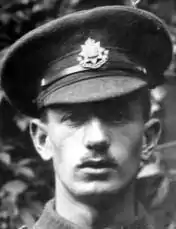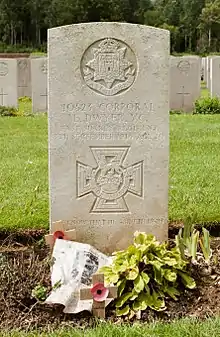Edward Dwyer
Corporal Edward Dwyer, VC (25 November 1895 – 3 September 1916) was a British Army soldier and an English recipient of the Victoria Cross (VC), the highest award for gallantry in the face of the enemy that can be awarded to British and Commonwealth forces.
Edward Dwyer | |
|---|---|
 | |
| Born | 25 November 1895 Fulham, London, England |
| Died | 3 September 1916 (aged 20) Guillemont, France |
| Buried | Flatiron Copse Cemetery, Mametz |
| Allegiance | United Kingdom |
| Service/ | British Army |
| Years of service | 1911–1916 |
| Rank | Corporal |
| Service number | 10523 |
| Unit | East Surrey Regiment |
| Battles/wars | First World War |
| Awards | Victoria Cross Cross of St. George |
Early life
Dwyer was born in Fulham, London, on 25 November 1895.
First World War

Dwyer was 19 years old, and a private in the 1st Battalion, East Surrey Regiment, British Army during the First World War, when was awarded the VC for his actions on 20 April 1915 at Hill 60 in Belgium.
For most conspicuous bravery and devotion to duty at "Hill 60" on the 20th April, 1915. When his trench was heavily attacked by German grenade throwers he climbed on to the parapet, and, although subjected to a hail of bombs at close quarters, succeeded in dispersing the enemy by the effective use of his hand grenades. Private Dwyer displayed great gallantry earlier on this day in leaving his trench, under heavy shell fire, to bandage his wounded comrades.[1]
Dwyer was also awarded the Cross of St. George by Russia.[2] He later achieved the rank of corporal. He was killed in action at Guillemont, France on 3 September 1916. His grave is located at Flatiron Copse Military Cemetery, France, which is 4 miles east of Albert (Plot III, Row J, Grave 3).[2]
Apart from Jack Cornwell of the Royal Navy, Dwyer was the youngest VC recipient of the First World War.[3]
His VC is displayed at the Princess of Wales's Royal Regiment (Queens and Royal Hampshires) Museum located in Dover Castle, Kent.
Recording
In 1916, Dwyer made an audio recording for the Regal record label in which he described taking part in the Retreat from Mons in the early days of the war. The monologue describes life at the front, pay and rations, and includes a sample of one of the songs sung by soldiers at the time. Both sides of the Regal disc (each lasting about 3 minutes) made for the British enlistment services are available on the archive audio collections Oh! It's a Lovely War (Vol 1) and Artists Rifles on CD41, which along with the Dwyer sides includes popular and patriotic songs, marches and descriptive sketch records. Dwyer's recording appears to be the only one made by a serving British soldier during the Great War, and as such is unique. Part of the recording was used in the 2003 documentary The First World War.[4]
Bibliography
- Batchelor, Peter; Matson, Christopher (2011). The Western Front 1915. VCs of the First World War. Stroud, Gloucestershire: The History Press. ISBN 978-0-7524-6057-4.
References
- "No. 29170". The London Gazette (Supplement). 21 May 1915. pp. 4989–4990.
- Dwer, Edward, Commonwealth War Graves Commission
- Langley, Michael (1972). The East Surrey Regiment. London: Leo Cooper. pp. 67–68. ISBN 0-85052-114-9.
- "Sound file" (MP3). Firstworldwar.com. Retrieved 27 June 2022.